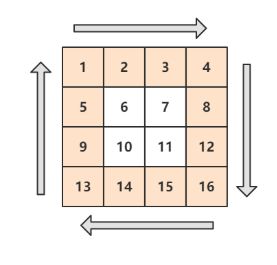剑指offer题解(八):c++&java
二叉树的镜像
题目描述
操作给定的二叉树,将其变换为源二叉树的镜像。
解题思路
c++
class Solution {
private:
void swapfun(TreeNode *root)
{
TreeNode *t = root->left;
root->left = root->right;
root->right = t;
}
public:
void Mirror(TreeNode *pRoot) {
if(pRoot == NULL)
return;
swapfun(pRoot);
Mirror(pRoot->left);
Mirror(pRoot->right);
}
};java
public void Mirror(TreeNode root) {
if (root == null)
return;
swap(root);
Mirror(root.left);
Mirror(root.right);
}
private void swap(TreeNode root) {
TreeNode t = root.left;
root.left = root.right;
root.right = t;
}对称的二叉树
题目描述
请实现一个函数,用来判断一颗二叉树是不是对称的。注意,如果一个二叉树同此二叉树的镜像是同样的,定义其为对称的。
解题思路
c++
class Solution {
private:
bool duicheng(TreeNode* t1, TreeNode* t2)
{
if(t1==NULL&&t2==NULL)
return true;
if(t1==NULL||t2==NULL)
return false;
if(t1->val!=t2->val)
return false;
return duicheng(t1->left,t2->right)&&duicheng(t1->right,t2->left);
}
public:
bool isSymmetrical(TreeNode* pRoot)
{
if(pRoot==NULL)
return true;
return duicheng(pRoot->left,pRoot->right);
}
};java
boolean isSymmetrical(TreeNode pRoot) {
if (pRoot == null)
return true;
return isSymmetrical(pRoot.left, pRoot.right);
}
boolean isSymmetrical(TreeNode t1, TreeNode t2) {
if (t1 == null && t2 == null)
return true;
if (t1 == null || t2 == null)
return false;
if (t1.val != t2.val)
return false;
return isSymmetrical(t1.left, t2.right) && isSymmetrical(t1.right, t2.left);
}顺时针打印矩阵
题目描述
下图的矩阵顺时针打印结果为:1, 2, 3, 4, 8, 12, 16, 15, 14, 13, 9, 5, 6, 7, 11, 10
java
public ArrayList printMatrix(int[][] matrix) {
ArrayList ret = new ArrayList<>();
int r1 = 0, r2 = matrix.length - 1, c1 = 0, c2 = matrix[0].length - 1;
while (r1 <= r2 && c1 <= c2) {
for (int i = c1; i <= c2; i++)
ret.add(matrix[r1][i]);
for (int i = r1 + 1; i <= r2; i++)
ret.add(matrix[i][c2]);
if (r1 != r2)
for (int i = c2 - 1; i >= c1; i--)
ret.add(matrix[r2][i]);
if (c1 != c2)
for (int i = r2 - 1; i > r1; i--)
ret.add(matrix[i][c1]);
r1++; r2--; c1++; c2--;
}
return ret;
} c++
class Solution {
public:
vector<int> printMatrix(vector<vector<int>> matrix) {
int row=matrix.size();
int col=matrix[0].size();
vector<int> result;
if(row==0||col==0)
return result;
int left=0,right=col-1,top=0,btm=row-1;
while(left<=right&&top<=btm)
{
for(int i=left;i<=right;i++)
result.push_back(matrix[top][i]);
if(topfor(int i=top+1;i<=btm;i++)
result.push_back(matrix[i][right]);
if(topfor(int i=right-1;i>=left;i--)
result.push_back(matrix[btm][i]);
if(top+1for(int i=btm-1;i>=top+1;i--)
result.push_back(matrix[i][left]);
left++;right--;top++;btm--;
}
return result;
}
}; 包含 min 函数的栈
题目描述
定义栈的数据结构,请在该类型中实现一个能够得到栈最小元素的 min 函数。
c++
class Solution {
public:
void push(int value) {
st.push(value);
if(smin.empty())
smin.push(value);
if(smin.top()>value)
smin.push(value);
}
void pop() {
if(smin.top()==st.top())
smin.pop();
st.pop();
}
int top() {
return st.top();
}
int min() {
return smin.top();
}
private:
stack<int> st;
stack<int> smin;
};java
private Stack stack = new Stack<>();
private Stack minStack = new Stack<>();
public void push(int node) {
stack.push(node);
minStack.push(minStack.isEmpty() ? node : Math.min(minStack.peek(), node));
}
public void pop() {
stack.pop();
minStack.pop();
}
public int top() {
return stack.peek();
}
public int min() {
return minStack.peek();
} 
